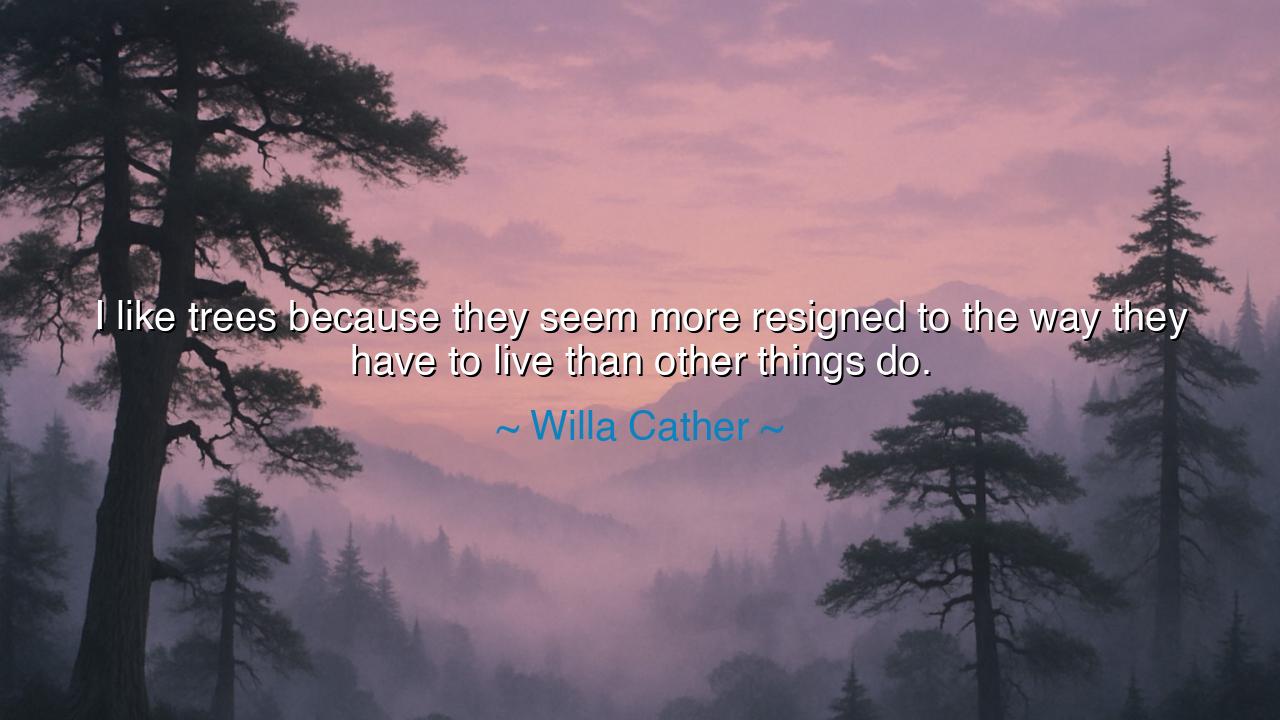
I like trees because they seem more resigned to the way they
I like trees because they seem more resigned to the way they have to live than other things do.






Hear the words of Willa Cather: “I like trees because they seem more resigned to the way they have to live than other things do.” At first, these words appear simple, even quiet, as though spoken in passing by one who loves the natural world. But beneath them lies a meditation as old as the earth itself. The tree does not wander, it does not complain, it does not flee the storms that batter it. It stands where it has been rooted, yielding to what it cannot change, yet growing upward with quiet dignity. In its stillness, it becomes a lesson in endurance and in peace.
The ancients often revered the tree as a symbol of wisdom and patience. In Norse myth, Yggdrasil, the world-tree, bound together heaven, earth, and underworld. In India, the Bodhi tree became the seat of the Buddha’s enlightenment, where he sat unmoving until truth revealed itself. And in the scriptures of many faiths, the tree is the emblem of life itself, steady through the cycles of birth, decay, and renewal. Unlike man, who frets against his fate, the tree does not resist its place — it accepts, and in its acceptance, it thrives.
To be resigned, in Cather’s sense, is not to be broken. It is not despair, nor surrender to hopelessness. It is the quiet wisdom of knowing what cannot be altered and choosing instead to grow within those bounds. A tree cannot uproot itself and flee the drought, yet it digs deeper for water. It cannot shield itself from wind, yet it bends so as not to break. It cannot command the seasons, yet it blossoms in spring, yields fruit in summer, sheds in autumn, and sleeps in winter. This is not weakness — it is strength in harmony with reality.
History shows us the power of this truth in human lives. Consider Nelson Mandela, who spent twenty-seven years confined in prison. Many men in his place would have broken, raging against the bars, consumed by bitterness. Yet Mandela, like the tree, grew even in confinement. He was resigned to the place he had to live, yet within that resignation, he deepened in patience, in wisdom, in vision. When at last he was freed, he stood not twisted with hatred, but upright as a giant oak, ready to shelter a nation. His life, like the tree, teaches us that resignation to circumstance can birth an inner strength that transforms the world.
Cather’s words also remind us of the contrast between man and the natural world. Animals run when danger comes. Humans, restless and clever, scheme and rebel against their limitations, often exhausting themselves in the struggle. But the tree does neither. It does not run, nor does it rage — it abides. It is this serenity that Cather admires: a living example that peace is not found in endless striving, but in the acceptance of place, and the quiet determination to grow where one is planted.
The lesson for us, then, is profound: there will always be forces in life that we cannot control — illness, loss, time, the choices of others. To resist them endlessly is to waste our strength. Like the tree, we must learn the art of resignation: not a giving up, but a giving in to reality, and finding within it the possibility of growth. Bend when the winds blow, deepen your roots in times of drought, and wait with patience for the return of spring.
Practically, take time each day to walk among trees, and let them be your teachers. Observe their steadiness, their silence, their way of yielding without ceasing to live. When life feels heavy, ask yourself: what is within my power to change, and what must I accept? Then, like the tree, pour your energy not into railing against fate, but into growing where you are. In doing so, you will discover a peace far greater than the restless struggle for control.
So let us carry Willa Cather’s insight in our hearts: “I like trees because they seem more resigned to the way they have to live than other things do.” For in the tree, we see our own destiny mirrored — to stand firm in the place we are given, to accept the limits of our lives, and yet, within those limits, to rise upward, bearing fruit, offering shade, and becoming part of the eternal rhythm of life.






AAdministratorAdministrator
Welcome, honored guests. Please leave a comment, we will respond soon